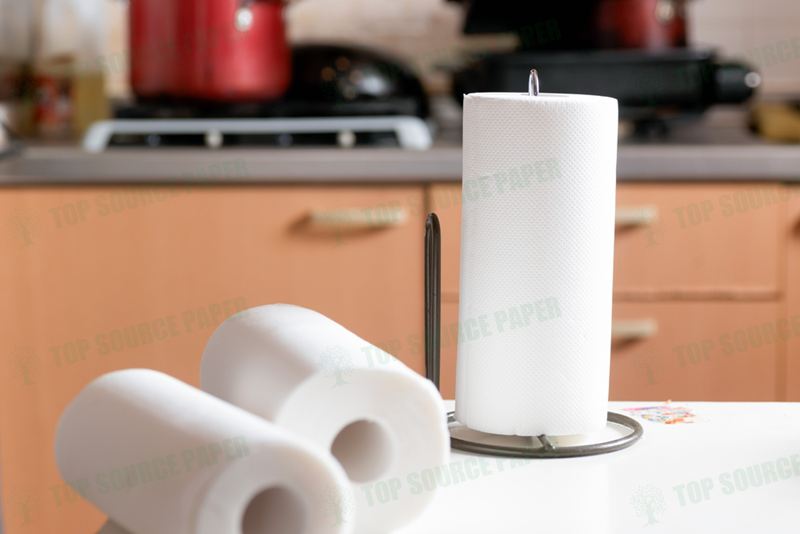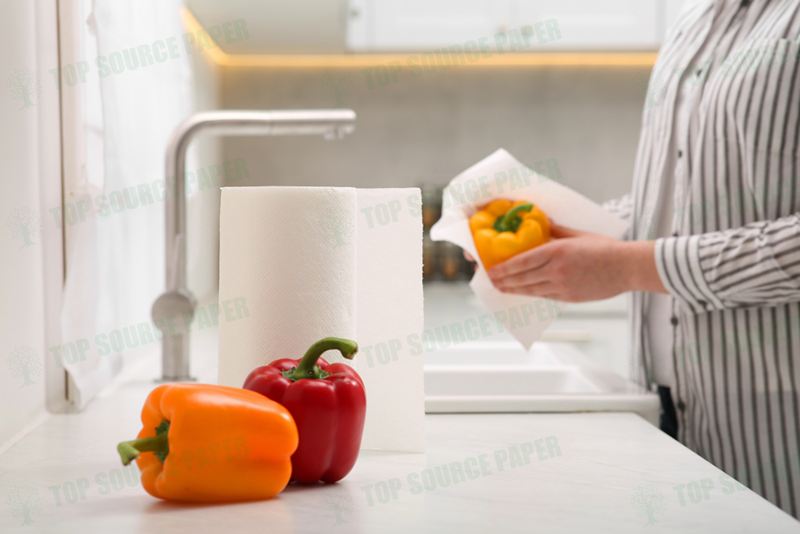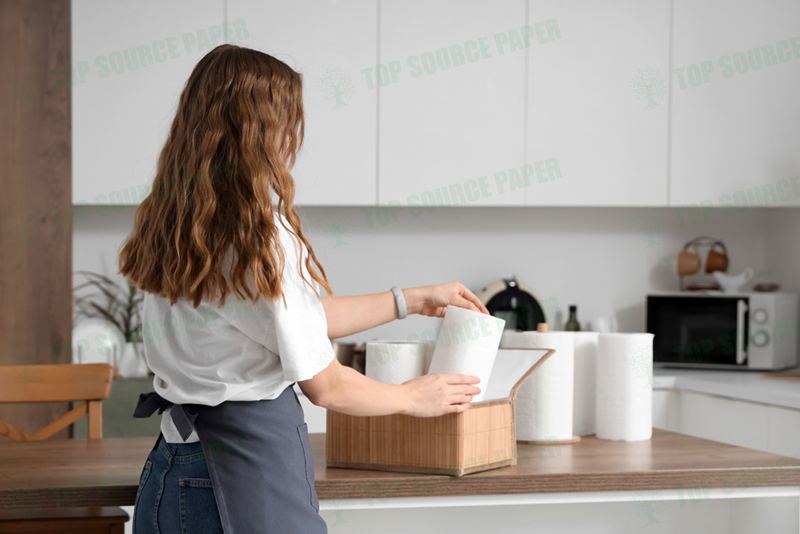Every year, millions of kitchen paper towels end up in landfills, contributing to unnecessary waste and environmental harm. The simple act of disposing them properly can make a significant difference—but most people don’t know the right way to do it.
Whether you’re composting lightly used towels or responsibly trashing heavily soiled ones, understanding proper disposal methods helps reduce your environmental footprint. In this guide, we’ll break down the best practices for disposing toallas de papel de cocina, from recycling rules to composting tips, so you can make eco-friendly choices with confidence.
The Environmental Impact of Improper Paper Towel Disposal
When you toss used toallas de papel de cocina in the trash without a second thought, you might not realize the ripple effect it has on the environment. “Tossing” them improperly contributes to landfill overload, deforestation, and even chemical pollution. Let’s break down why disposing toallas de papel de cocina the right way matters—and how small changes can make a big difference.
Landfill Overload: How Paper Towels Contribute to Waste
Paper towels might seem harmless, but they take up massive space in landfills. Unlike food waste, they don’t break down easily, especially if they’re coated with oils or chemicals. This means more landfills filling up faster, leading to higher costs for waste management systems. If you’re disposing toallas de papel de cocina in the trash, you’re adding to this growing problem.
Deforestation and Resource Depletion
Making paper towels requires trees—lots of them. The more we use, the more forests are cut down. Even recycled paper towels still need energy and water to produce. By reducing use or switching to reusable alternatives, we can help slow deforestation and conserve resources.
The Role of Chemicals in Environmental Damage
Many paper towels are treated with bleach, dyes, or synthetic fragrances. When these end up in landfills, chemicals can seep into soil and water, harming wildlife and ecosystems. Composting might seem like a solution, but not all paper towels are safe for compost bins—especially if they’ve touched grease or cleaning products.
Impact on Waste Management Systems
Improper disposal strains local waste systems. Contaminated paper towels can’t be recycled, forcing facilities to send them to landfills. This increases processing costs and pollution. Some cities even fine businesses for incorrect waste sorting—another reason to rethink how we handle used towels.
Sustainable Alternatives and Solutions
| Opción | Beneficio ambiental | Impacto en el costo | Ease of Use | Best For |
|---|---|---|---|---|
| Reusable Cloths | Zero waste, long-term use | Low (one-time purchase) | High (needs washing) | Home kitchens |
| Unbleached Paper Towels | No chemical runoff, compostable | Moderate (higher upfront cost) | High (same as regular towels) | Eco-conscious users |
| Bamboo-Based Towels | Renewable material, biodegradable | Moderado | Alto | Commercial kitchens |
| Air Hand Dryers | No waste, energy-efficient | High (installation) | Medium (learning curve) | Public restrooms |
| Recycled Content Towels | Reduces tree consumption | Low to moderate | Alto | Budget-friendly green option |
Companies like Top Source Paper offer eco-friendly options, such as unbleached or recycled-content paper towels, which help reduce environmental harm. By choosing sustainable products and proper disposal methods, we can lessen the strain on landfills and natural resources.
“Switching to reusable cloths or compostable paper towels can cut household waste by up to 30%, making a real difference in environmental impact.”
Small changes add up. Whether it’s using fewer paper towels, composting when possible, or supporting brands that prioritize sustainability, every step helps protect the planet. Check your local waste guidelines—some areas accept unsoiled paper towels in compost bins, while others require special disposal.
Understanding the Recycling Reality of Kitchen Paper Towels
Many people assume all paper products can be recycled, but kitchen paper towel recycling follows different rules. While paper towels are technically made from paper fibers, most recycling programs reject them due to contamination risks. Let’s uncover why this happens and how you can make smarter disposal choices.
Why Most Paper Towels Can’t Be Recycled
Unlike office paper or newspapers, paper towels are designed to absorb liquids and trap particles. This very purpose makes toalla de papel de cocina recycling problematic. The fibers become too short and weak during the pulping process, reducing their value for reprocessing. Additionally, the average paper towel goes through 5-7 uses before disposal, accumulating too many contaminants.
Contamination Concerns: Food, Grease, and Chemicals
Just one greasy paper towel can contaminate an entire bale of recyclables. Most facilities automatically discard:
- Towels used with cooking oils
- Cleaning product residues
- Food particles (especially meat juices)
- Personal care product traces
Local Recycling Guidelines and Regulations
| Location | Paper Towel Policy | Opciones alternativas | Special Programs | Penalties for Contamination |
|---|---|---|---|---|
| San Francisco | Not accepted | Compost clean towels | Green Bin program | $100 fine for repeat offenses |
| New York City | Landfill only | Ninguno | Zero Waste challenge | Warning stickers |
| Austin, TX | Compost if unbleached | Reusable cloth program | Curbside composting | Service suspension |
| Seattle | Food soiled=compost | Drop-off locations | Clean Paper initiative | Extra garbage fees |
| Toronto | Green bin acceptable | Municipal collection | Waste Wizard tool | Education letters |
Preparing Paper Towels for Potential Recycling
For those rare cases where toalla de papel de cocina recycling is possible (like some commercial composting programs), follow these steps:
- Use only for dry tasks (wiping hands, dusting)
- Choose unbleached, dye-free brands
- Separate immediately after use
- Store in breathable containers
“Proper paper towel disposal starts at purchase – selecting 100% recycled, unbleached towels gives them the best end-of-life options.”
Companies like Top Source Paper now offer compost-compatible paper towels that meet higher sustainability standards. When consumers demand better products, manufacturers respond with innovations that make toalla de papel de cocina recycling more feasible.
Composting Kitchen Paper Towels: A Step-by-Step Guide
Turning used toallas de papel de cocina into nutrient-rich compost is easier than you think. When disposing toallas de papel de cocina, composting offers an eco-friendly alternative to landfills. Let’s break down how to transform your paper waste into garden gold while keeping things sustainable.
What Kind of Paper Towels Can Be Composted?
Not all paper towels are created equal for composting. Look for:
- Unbleached, dye-free varieties
- Towels used with water or plant-based foods
- Brands without synthetic additives
Avoid composting towels contaminated with meat, oils, or chemical cleaners.
Setting Up Your Compost System
| System Type | Best For | Paper Towel Capacity | Maintenance Level | Compost Ready Time |
|---|---|---|---|---|
| Backyard Bin | Homes with outdoor space | 2-3 lbs/week | Moderado | 3-6 months |
| Bokashi | Apartments | 1 lb/week | Bajo | 4-8 weeks |
| Vermicompost | Year-round composting | 1-2 lbs/week | Alto | 2-4 months |
| Municipal Program | No-space solutions | Unlimited | Ninguno | Varía |
| Tumbler | Fast results | 3-5 lbs/week | Moderado | 4-8 weeks |
The Composting Process: Layering and Maintenance
For successful composting when disposing toallas de papel de cocina:
- Shred towels into small pieces
- Mix with green materials (vegetable scraps)
- Add brown materials (dry leaves)
- Maintain 50/50 moisture balance
- Turn pile weekly
“Proper layering can accelerate decomposition by 40%, turning paper towels into usable compost in as little as 8 weeks.”
Troubleshooting Common Composting Issues
Watch for these signs and solutions:
- Odors: Add more brown materials
- Slow breakdown: Increase aeration
- Pests: Bury food waste deeper
Companies like Top Source Paper now produce compost-friendly paper towels that break down faster, supporting sustainable disposal practices. When choosing products, look for the compostability certification to ensure easy breakdown.
Alternative Disposal Methods and When to Throw Away Paper Towels
While composting and recycling are ideal, sometimes the disposal of papel de cocina towels requires different approaches. Understanding when and how to properly trash paper towels helps prevent environmental contamination and supports effective waste management.
Proper Trash Disposal: Bagging and Containing Waste
When disposing kitchen paper towels in regular trash:
- Use sealed bags to prevent odor and pests
- Double-bag towels with food residue
- Keep waste bins away from moisture
This method is best for towels contaminated with oils or cleaning chemicals.
Hazardous Waste Considerations: Dealing with Chemical Contamination
| Contaminant | Disposal Method | Safety Precautions | Alternative Solutions | Impacto ambiental |
|---|---|---|---|---|
| Bleach | Special collection | Usar guantes | Use unbleached towels | Alto |
| Cooking oils | Landfill (sealed) | Cool completely | Compostable alternatives | Medio |
| Chemical cleaners | Hazardous waste | Label clearly | Microfiber cloths | Very high |
| Paint residues | Special facility | Dry completely | Drop cloths | Extreme |
| Medical waste | Biohazard disposal | Red bags | Disposable wipes | Critical |
Incineration: An Overview of the Process
Some municipalities use controlled incineration for proper paper towel disposal. This method:
- Reduces landfill volume by 90%
- Generates energy in modern facilities
- Requires strict emission controls
Check local regulations as practices vary widely.
“Reducing paper towel use by just 25% could save an average household 3 pounds of waste weekly, significantly lowering environmental impact.”
Minimizing Waste: Strategies for Reducing Paper Towel Usage
Top Source Paper recommends these sustainable practices:
- Use reusable cloths for routine cleaning
- Choose high-absorbency towels to reduce quantity needed
- Install air dryers in commercial settings
- Educate staff on proper portion control
Sustainable Alternatives: Reducing Your Reliance on Paper Towels
Every year, American households use about 13 billion pounds of paper towels – that’s enough to fill the Empire State Building “like, a bajillion times”. But there are smarter ways to manage kitchen cleanup that can dramatically reduce the environmental impact of kitchen paper towel disposal. Let’s explore some game-changing alternatives that are kinder to both your wallet and the planet.
Reusable Cloth Towels: Benefits and Maintenance
Switching to cloth towels can eliminate up to 90% of your paper towel waste. Top Source Paper recommends:
- Organic cotton or linen for best absorbency
- Designated color coding for different tasks
- Weekly washing with eco-friendly detergent
A single set of 12 cloth towels can replace 15 rolls of paper towels annually.
Bamboo Towels: A Sustainable and Absorbent Option
| Característica | Paper Towels | Bamboo Towels | Savings Potential | Beneficio ambiental |
|---|---|---|---|---|
| Absorbencia | Good | Excellent | 40% less product used | 5x lower carbon footprint |
| Durabilidad | Single-use | 100+ washes | $200+/year saved | Zero landfill waste |
| Production Impact | 17 trees/ton | Fast-growing grass | N / A | Biodegradable |
| Chemical Use | Often bleached | Natural fibers | Healthier home | No water pollution |
| Cost Over 3 Years | $600+ | $50-100 | 85% savings | Sustainable cycle |
Sponges and Other Reusable Cleaning Tools
Modern alternatives go beyond traditional options:
- Cellulose sponges (last 6x longer than plastic)
- Silicone scrubbers (dishwasher safe)
- Microfiber mitts (great for windows)
These options completely eliminate the need for disposing kitchen paper towels for cleaning tasks.
“A family switching to reusable alternatives can save 1.5 trees annually while reducing their household waste by nearly 300 pounds.”
The Long-Term Cost Savings of Eco-Friendly Alternatives
While sustainable options require slightly higher upfront costs, the long-term savings are substantial:
- 3-year savings: $400-800 for average household
- Reduced garbage bag usage
- Lower municipal waste fees
Top Source Paper is exploring bamboo-based product lines to support this sustainable shift in household habits.
Conclusión
After a decade in the paper industry, I’ve seen firsthand how small changes in disposal habits can create big environmental wins. Properly handling kitchen paper towels isn’t just about following rules—it’s about making conscious choices that add up over time.
Whether you’re composting clean towels or switching to reusables, every sustainable choice helps. The key is finding what works for your lifestyle while keeping that environmental impact in check. It’s not about perfection—it’s about progress.
At the end of the day, reducing waste is a **”obvio”** for both your conscience and your community. The next time you reach for a paper towel, ask yourself: “Is there a greener way?” The planet—and future generations—will thank you for it.
Preguntas frecuentes
Q1: Are used kitchen paper towels recyclable?
A1: No, used kitchen paper towels are generally not recyclable because they are often contaminated with food residues and oils, which interfere with the recycling process.
Q2: Can I compost my used kitchen paper towels?
A2: Yes, if the paper towels are only used for cleaning food spills and are free of harsh chemicals, they can be composted either at home or through municipal composting programs.
Q3: What is the environmental impact of disposing kitchen paper towels in landfills?
A3: When disposed of in landfills, used paper towels contribute to waste buildup and can release methane as they decompose, emphasizing the need for more sustainable disposal methods.
Q4: How can I reduce waste from kitchen paper towels?
A4: You can reduce waste by opting for reusable cloth towels or compostable alternatives, and by ensuring proper disposal to minimize environmental impact.
Q5: Do oily or greasy paper towels require special disposal methods?
A5: Yes, oily or greasy paper towels should not be recycled; they are best composted or disposed of following local waste management guidelines to prevent contamination.
Q6: Are recycling programs available for kitchen paper towels?
A6: Most recycling programs do not accept used, contaminated paper towels; it is advisable to check with your local waste management authority for any specialized collection or composting options.
Q7: What disposal practices should restaurants adopt for used paper towels?
A7: Restaurants should aim to reduce disposable use, separate and compost used paper towels when possible, and follow local regulations to manage waste sustainably.
Q8: Is composting a better option than recycling for used kitchen paper towels?
A8: Generally, composting is preferred over recycling for kitchen paper towels, as recycling is often not feasible due to contamination from food and grease.
Enlaces externos
- Recycle – U.S. Environmental Protection Agency
- CURBSIDE ORGANICS RECYCLING PROGRAM – Los Angeles
- Organics – Green Bin | Christchurch City Council
- How to Compost Food Scraps in L.A. – Los Angeles Times
- Recycling Basics – Extensión de la Universidad de Minnesota
- Life Cycle Analysis of Paper Recycling – Investigador
- Gestión de materiales sostenibles – U.S. Environmental Protection Agency
- Household Hazardous Waste and Recycling – University of Illinois Extension


